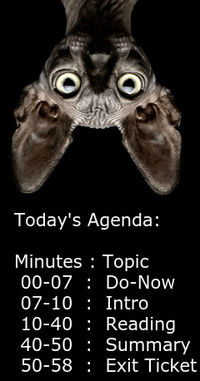Objective: you will cite strong and thorough textual evidence to support analysis of what the text says explicitly as well as inferences and conclusions based on an author’s explicit assumptions and beliefs about a subject.
Classwork: Read the stories on the left, and answer the questions on the right.
|
Story One: Last year I killed a man
- A True Story by Vaughan Thomas At 9.45am on Saturday, June 23 2008, I killed a man. A perfectly ordinary man, on a perfectly ordinary summer's day. CCTV pictures show him entering the station, unremarkable among all the passengers going to the West End. He waited at the front of the platform until he could hear my train approaching, then he calmly stepped down on to the tracks and looked directly at me as he waited for the impact. The impact was only a matter of seconds in coming, but those seconds felt like minutes. This wasn't how it was meant to be. It wasn't how I had imagined it during my years as a Central line train driver. We talk of "jumpers"; workmates tell of blurry images flashing in front of them, of the shock of the impact. I wasn't expecting to see a young man in jeans and a summer shirt waiting for death, looking me in the eye. As I hit the emergency brake, I was thinking, "Please, get out of the way. Now. Please let it be a prank." Youngsters on the track are a regular event, though no less frightening for that, and for train drivers it's something we learn to live with. But this wasn't a typical game of "chicken": he wasn't laughing and he wasn't with friends. When it became clear he wasn't going to move out of the way, I closed my eyes, covered my face and held my breath. By the time we were stationary, four of my eight cars were in the platform and I was on autopilot. I told the passengers there would be a delay in opening the doors due to an "incident", and was calling the line controller for assistance when I heard a tap on my cab door. A smart man inquired, "Do you know there's a person under your train?" I looked at the blood on the windshield momentarily before assuring him that, yes, I was aware. He paused for a heartbeat, looked at his watch and said, "So, how long before we get on the move again?" I was to look back on this exchange with amusement and also, strangely, comfort: in the midst of the horror, normality was briefly restored by a commuter asking for alternative travel arrangements. I'd advised the passengers to stay where they were and not to try to open the doors because we weren't fully in the platform; amazingly, they all complied. I walked back through the carriages opening the adjoining doors and shouting: "Please leave the train, and leave the station as quickly as possible!" Terrorist attacks were still very much on people's minds, and as each carriage emptied I looked to the next, seeing anxious faces through the windows. No one tried to leave until I opened the doors. Only a few asked the reason, none complained. I was hugely impressed. The next few hours were a blur of activity as the body was removed and service restored: station staff, police, firefighters, the emergency support unit and trauma counselors all came and went in a smooth, well-practiced exercise. The counselors reassured that it wasn't my fault, that there was nothing I could have done; it was his choice. All of which I knew, but it was good to hear from someone else. As a child of the enlightenment, a rationalist and an atheist, I was sure I wouldn't be unduly affected by the death of a person unknown. I was told I'd need some time off in case of post-traumatic stress; I agreed to counseling to assess my fitness to resume work, but was convinced this would be a formality. My return to work was speedy and for weeks I was seemingly unaffected. But in August a policeman came to brief me before the inquest and to show me the pictures. The unknown person now had a name, a family and a tragic story. Henrik Alexandersson had moved from Sweden to find work in London; he was successful and popular, but had been feeling sick. For some reason, he'd convinced himself his illness was Aids-related and that week he had gone for a check-up to find out the truth. By that Saturday, he could bear to wait no longer: he called his parents in such a state of distress that they booked a flight to London (arriving just hours too late.) He left a suicide note, and headed off for his fateful meeting with me. Had he waited a day longer, he would have learned that the HIV tests were negative. I left work and went home in the full realization that perhaps I am not such a rationalist after all, because I sobbed my heart out in the arms of my partner. A year has passed now, but I can still see Henrik standing on the track, awaiting the inevitable. Story Two - Herpes Brought us Together - A True Story by Anthony Matthews I'm not really sure how I became infected. I had partners here and there, but nobody told me they had anything. It's possible I caught it when I was a student at Cambridge. We didn't think about STDs or things like that; we only worried about getting people pregnant. If I'm honest, I can't swear that I always used protection when I had sex. I grew up in Horley, Surrey, but had graduated from university and moved to California when I was diagnosed in 1990. The awful thing about herpes is that you can have it for a while before you develop any symptoms. I remember clearly the day I learned I had it. I looked down and saw this little white blister, and it was hurting like heck. I was willing it to be something temporary, hoping it would just go away. And I remember feeling so embarrassed. I went to the doctor and she gave me the news. The first thing you are told about herpes is that there is no cure. You learn about it at a time when you're having unpleasant symptoms - and in the middle of all that, you have to deal with the fact that you have something that isn't going to go away. I was very upset for a long time. I put dating on hold for a year or so. But eventually I began to date again, and soon met the first woman I married. It is a difficult subject to broach when you start a relationship. I believe in being upfront, and just coming out with it. The subject of "the talk", as people with herpes call it, is one of the great discussions within the herpes community. The big question is, when do I tell you? Do I tell you the first time I am on a date with you? Is it right to jump straight into discussing the sexual aspect of a relationship? Or do I wait and tell you on the fifth date? There really isn't a good time. After my marriage broke up, I wanted to date somebody else with herpes - I suppose I was worried I would pass it on - and I started looking on the internet for dating sites for people with herpes, but there really wasn't anything. So I decided to start a dating site of my own. I had a little computing experience and I found a program for creating an online guest book and modified it into a dating site where people could post personal ads. I did this on my laptop over a weekend in October 1997. By the new year, more than 600 people had signed up. I called it Meet People With Herpes - mpwh.net. I cringed when I told my dad what I was doing. I didn't know what he was going to say, especially when I told him I had given up my highly paid engineering job. Until then, my family had no idea I had herpes. I guess it was like coming out. In truth, they were very supportive. My mum checks out the site every day to see how it's doing; she's really proud of what I've done. I'm not embarrassed that I have herpes, but talking about it can be embarrassing for family and friends. When I go to my kids' school, I don't talk much about the business - not because I am embarrassed for myself, but because I don't know what the other parents will think, and I really don't want to embarrass my children. I had been dating people on my website for a couple of years when Jodi signed up. I noticed she lived down the road from me. Luckily, I took down her details, because three days later she'd changed her mind and taken herself off the site. When I emailed her she was very sceptical because I was the website owner, but I sent her my picture anyway. One day I went to a concert in the park near where I live in Los Angeles and, although I didn't know it, Jodi was there, too. She recognized me from my picture, and even got close enough to overhear my English accent. I don't know if it was love at first sight or what, but after that she emailed me back and agreed to meet for a date. We went to a pizza restaurant and just clicked. The nice thing about dating someone with herpes is that it rarely comes up in conversation. Four months later we were wondering what to do one night. Jodi asked if I wanted to go to a movie. I said, "How about we go and get married in Vegas?" She said, "Sure." So we jumped in the car, drove for five hours and got married at three in the morning in a drive-thru chapel. We work together for the website now. We've got 48,000 members all across the world. I'm just glad to have this amazing job that allows me to help and support others who have been through exactly what I have. |
|




